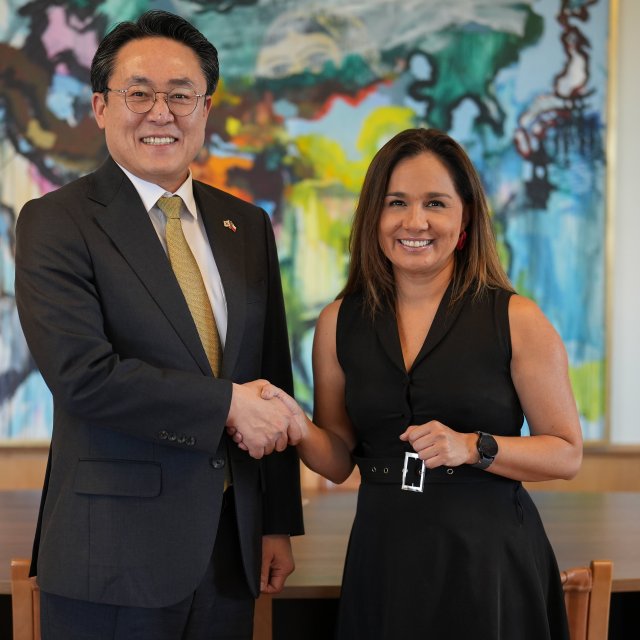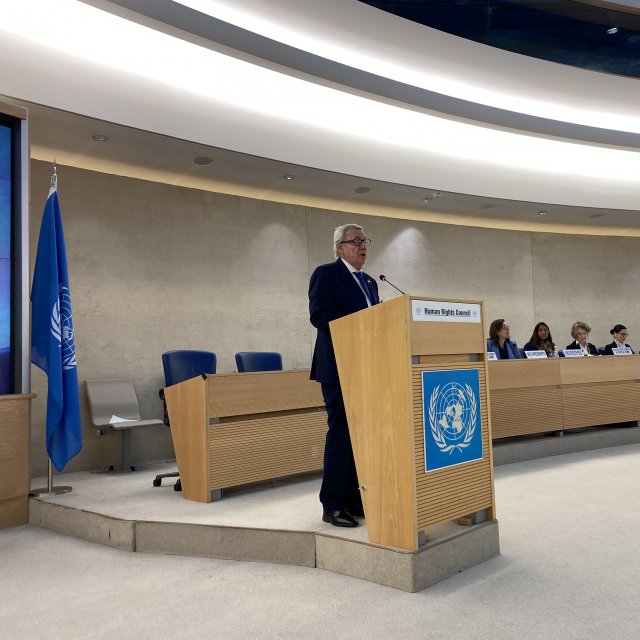 Thursday, February 27th 2025
Undersecretary meets with the Minister of Oceans and Fisheries of the Republic of Korea
Thursday, February 27th 2025
Undersecretary meets with the Minister of Oceans and Fisheries of the Republic of Korea
Negotiations for the modernization of the Association Agreement between Chile and the European Union conclude

In recent days, the technical negotiations for the modernization of the Association Agreement between Chile and the European Union (EU) ended, a process based on the terms of reference agreed with the latter in 2017, during the last government of former President Michelle Bachelet.
With this modernization, the negotiation of which ended after 13 rounds of negotiation since 2018, both parties are seeking a new, last generation Agreement, more robust and that projects the bilateral relationship in political, cooperation, and commercial terms. Chile takes a leap linking itself with Europe, strengthening alliances in digital trade and services, benefiting thousands of SMEs; caring for the environment, and gender equality.
The Agreement reached will open up new perspectives and opportunities within the framework of a consolidated relationship from an economic-commercial point of view, especially in a context of economic reactivation, with the European Union.
From an economic point of view, the EU is Chile's third commercial partner, the first investor, and the third regional destination for our investments. The basis of this relationship has been precisely the Association Agreement that entered into force in 2003. In the context of reactivating our economy in the post-pandemic period, the modernization of the aforementioned Agreement will be key to increasing our global competitive value and reinforcing a significant commitment to attracting foreign investment to our country while opening up new opportunities abroad for our entrepreneurs.
Foreign Minister Andrés Allamand stated: "The technical conclusion of the modernization of the Chile-EU Association Agreement is the result of a 4-year process that has involved different Chilean governments and EU mandates. This modernization addresses the new challenges we face, such as climate change, through the effective implementation of the Paris Agreement, collaborative work on energy transitions, being strategic partners to promote the EU Green Deal and our National Green Hydrogen Strategy, the digital economy, as well as trade and gender, by incorporating a specific chapter on this matter for the first time in any EU trade agreement, among others."
Lastly, he added: "We are very pleased to have achieved this result joined by our negotiating teams and Executive Vice President Dombrovskis and High Representative Borrell. This is an important milestone, with legal issues remaining and which still requires the approval of the European Council and Parliament, but it is an important step towards the realization of a long-awaited - and necessary - modernization of an agreement that has been in force for almost 20 years."
The negotiation of the Agreement, in its Commercial and Investment pillar, was under the responsibility of the Undersecretary of International Economic Relations, led by Rodrigo Yáñez, while its Political and Cooperation Pillar, of the Undersecretariat of Foreign Relations, led by Carolina Valdivia.
Among the main benefits that the modernization of this Agreement would mean for Chile, the following stand out:
Liberalization of Trade in Goods: The new Agreement contemplates a significant improvement in the conditions of access to the European market for nearly 900 products from the agricultural, agro-industrial, and fishing sectors, bringing to almost 99.6% the total of Chilean products with tariff preferences in the EU market.
Services: The modernization of this Chapter will allow for updated disciplines that are more ambitious than those contained in the 2003 Association Agreement and that will facilitate access to thousands of SMEs to the European Union, which is the most ambitious agreement in terms of access to markets in services subscribed by Chile. In matters of national regulation, clear and transparent rules will be established for the granting of licenses and licensing procedures in those sectors that require it.
Temporary Entry of Business People: The agreement will establish clear and more favorable rules that will allow Chilean business people to enter European territory to carry out services or make investments, as well as attend conferences and business meetings. Additionally, clear and transparent rules will be established to regulate the obtaining of immigration formalities to enter European territory in order to carry out the economic activities contained in this chapter.
Investments: A comprehensive legal framework is established that regulates investments between Chile and the EU, replacing the 16 bilateral Investment Protection Agreements in force between Chile and EU Member States and two that were signed and did not enter into force, correcting inconsistencies and existing divergences between them, which have been criticized by various sectors in recent times. Likewise, a chapter is established that would have a regime of protection and liberalization of investments that at the same time would guarantee the legitimate right to regulate the State. Regarding dispute resolution, the parties establish a permanent Investment Court, although with a light and agile structure.
Sustainable Development: The approach under which the negotiation was carried out implies a strengthening of the relationship between trade and the realization of economic development with an important sustainable component. In this way, our relationship with the economic bloc is endowed with a priority concern for areas as relevant as the protection of labor rights and the environment, becoming the greenest agreement signed by Chile, by expressly incorporating the standards of the Agreement on Paris. The current Economic Association Agreement does not include commitments in this regard, and therefore it seems to us that it constitutes a positive aspect of the future agreement, and that, in addition, it is in line with the 2030 Agenda in which the three pillars of sustainable development are integrated - economic, social and environmental.
Digital Commerce: This area is not contemplated in the Agreement currently in force, and its regulation will facilitate exchange through measures such as the cross-border recognition of electronic signatures, the non-application of tariffs on electronic transmissions, among other measures.
Gender and Trade: This is a pioneering Agreement by including this matter with a view to encouraging equal opportunities and treatment so that men and women benefit equally from the development opportunities that will open up with the implementation of the Agreement.
Energy and Raw Materials: The Agreement establishes a strategic alliance between Chile and the EU to develop Chile's National Green Hydrogen Strategy and the EU Green Pact, facilitating trade and exchange of this type of goods, at the same time that safeguarding the regulatory space for the development of public policies in support of emerging industries.
Environmental Matters: The Agreement promotes the establishment of high standards of protection and effective compliance with sector legislation, promoting the conservation and sustainable use of biological diversity. For the first time, the MEAs and the Paris Agreement are incorporated into a trade agreement signed by Chile, as effective standards.
Public Procurement: The Agreement modernizes the principles and obligations in matters of public procurement, facilitating the access of Chilean suppliers to the European public market, through greater legal certainty and clear rules that prevent discrimination, allowing them to access the same treatment that any European supplier.
Chile has an extensive network of trade agreements, which includes 30 free trade agreements, which give our entrepreneurs preferential access to 65 economies, more than 5 billion people, and about 88% of world GDP.
Related articles
 Thursday, February 27th 2025
Undersecretary meets with the Minister of Oceans and Fisheries of the Republic of Korea
Thursday, February 27th 2025
Undersecretary meets with the Minister of Oceans and Fisheries of the Republic of Korea
 Monday, February 24th 2025
Minister van Klaveren reaffirms Chile's commitment to human rights and gender equality
Monday, February 24th 2025
Minister van Klaveren reaffirms Chile's commitment to human rights and gender equality









